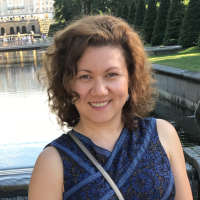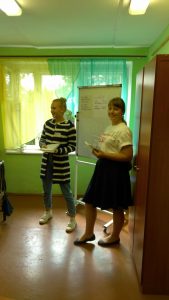
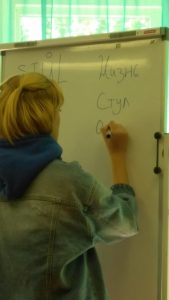
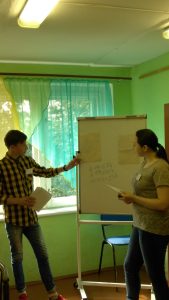
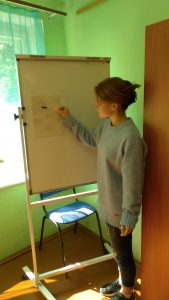
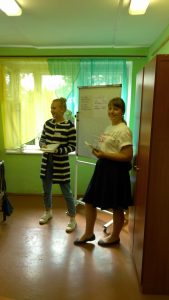
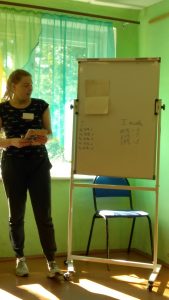

Scientific Conference
Course “Psycholinguistics:
what you can learn about the brain knowing the structure of the linguistic system”
August 16, 2018
10.00-12.00
Научная конференция семинара
«Психолингвистика:
что можно узнать о мозге, зная структуру языковой системы»
16 августа 2018
10.00-12.00
10.10. Афанасьева Инна «Роль звуковых ассоциаций в понимании значения слова».
Эксперимент прослеживает способность мозга использовать ассоциации по звучанию для понимания значения слова. Несбалансированные билингвы и монолингвы слушают слова из разных языков, где звуковая форма вызывает определенные образные ассоциации. Испытуемые используют ассоциативное мышление, чтобы определить значение новых слов. Эксперимент показывает интуитивное понимание слов и проверяет насколько это понимание верное.
10.10. Afanasieva Inna “The role of phonetic associations in word comprehension”.
This experiment investigates the ability of the brain to use phonetic associations to figure out the meaning of words. Non-balanced bilinguals and monolinguals listen to words in different languages, where the sound form triggers certain imagery associations. The participants define the meanings of the new words by association. The experiment shows that word comprehension can be intuitive and tests how accurate this type of word recognition is.
10.30. Беляева Ксения, Шутова Анастасия «Эффект контекста в распознавании слов»
Целью исследования является выявление ситуаций, в которых у людей в наибольшей степени проявляется интуитивность в понимании иностранного языка. В эксперименте несбалансированные билингвы со средним уровнем знания второго языка определяют что перед ними: реальное или придуманное слово (неслово). Слова представлены в контексте предложения или отдельным списком. Результаты эксперимента говорят о том, что влияет на распознование слов. Кроме того, влияние контекста может быть негативным.
10.30. Belyaeva Ksenya, Shutova Anastasia “Effect of Context in Word-recognition”
This experiment is aimed at eliciting the situations where people’s intuition in understanding a foreign language shows at a high degree. The experiment asks non-balanced low intermediate bilinguals to decide if they see a word or a non-word of the L2. The words are presented in the context of a sentence or separately. The results allow for the conclusion that context influences word recognition. The study also finds out that context can have a non-facilitative effect.
10.50. Гусева Мария, Кощеева Елена «Схожесть по форме: помощь или препятствие»
Проект изучает способность мозга преодолеть схожесть слов по форме при освоении различий в их значении. Группе подростков предложен список слов, в котором содержатся слова – «ложные друзья переводчика», на чешском и русском. В эксперименте испытуемые заучивают эти слова. Эксперимент выястняет является ли схожесть по форме препятствием в осовении значения слов и как мозг преодолевает это препятствие.
10.50. Guseva Maria, Koshcheeva Elena “Similarity in form: facilitation or an obstacle”
The project explores the ability of the human brain to disregard the similarity of word forms to acquire differences in their meaning. A group of teenagers is given a list of Check and Russian words that contains false-friends. The participants memorize the words. The experiment tests whether similarity in form is an obstacle in the acquisition of meaning and how the brain overcomes it.
11.10. Жигалова Мария, Попов Даниил «Гендерный и языковой фактор в определении грамматичности»
Эксперимент исследует насколько хорошо лицеисты могут оценить грамматичность предложений на родном и неродном языке. Проект сопоставляет результаты по гендерному принципу и по принципу «родной-неродной» язык. Эксперимент выясняет зависит ли оценка грамматичности от половой принадлежности и вы явлет разницу между оценкой предложения на родном и неродном языке.
11.10. Zhigalova Maria. Popov Daniel “Gender and Language as factors in grammaticality judgement”
This experiment investigates how well teenagers from the “Summer Lyceum” differentiate grammatical and ungrammatical sentences in their native and non-native languages. The project compares the results by gender and by the language being native or non-native. The experiment finds out whether grammaticality judgment depends on the gender or on the factor that the task is performed in the native or in the non-native language.
11.30. Ермолова Светлана «Чувствительность неактивной лингвистической системы второго языка к лексичесокй информации»
Эксперимент проверяет насколько активен в мозге второй язык, когда 10 девочек одного возраста из разных школ не используют его 2 месяца. Материалом задания являются реальные и вымышленные слова (неслова). Эксперимент проверит насколько временно деактивированная система второго языка восприимчива к новой лексической информации.
11.30. Eromolova Svetlana “Sensitivity of the deactivated system of the second languages to lexical information”
This experiment tests whether the L2 is active in the brain when 10 girls of the same age from different schools have not been using it for 2 months. The material of the study is real words and non-words. The experiment tests the sensitivity of the temporarily deactivated L2 system to lexical information.
